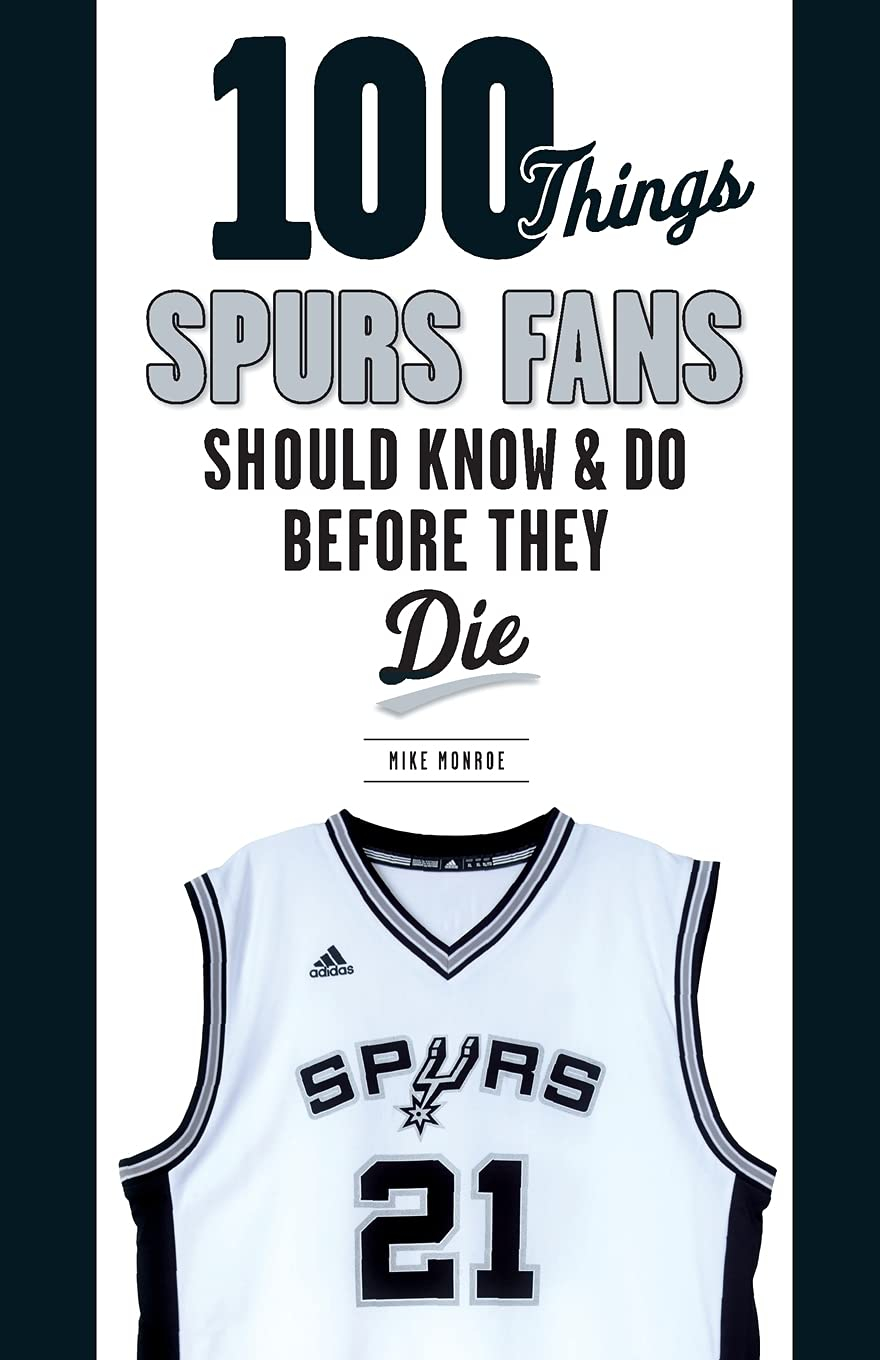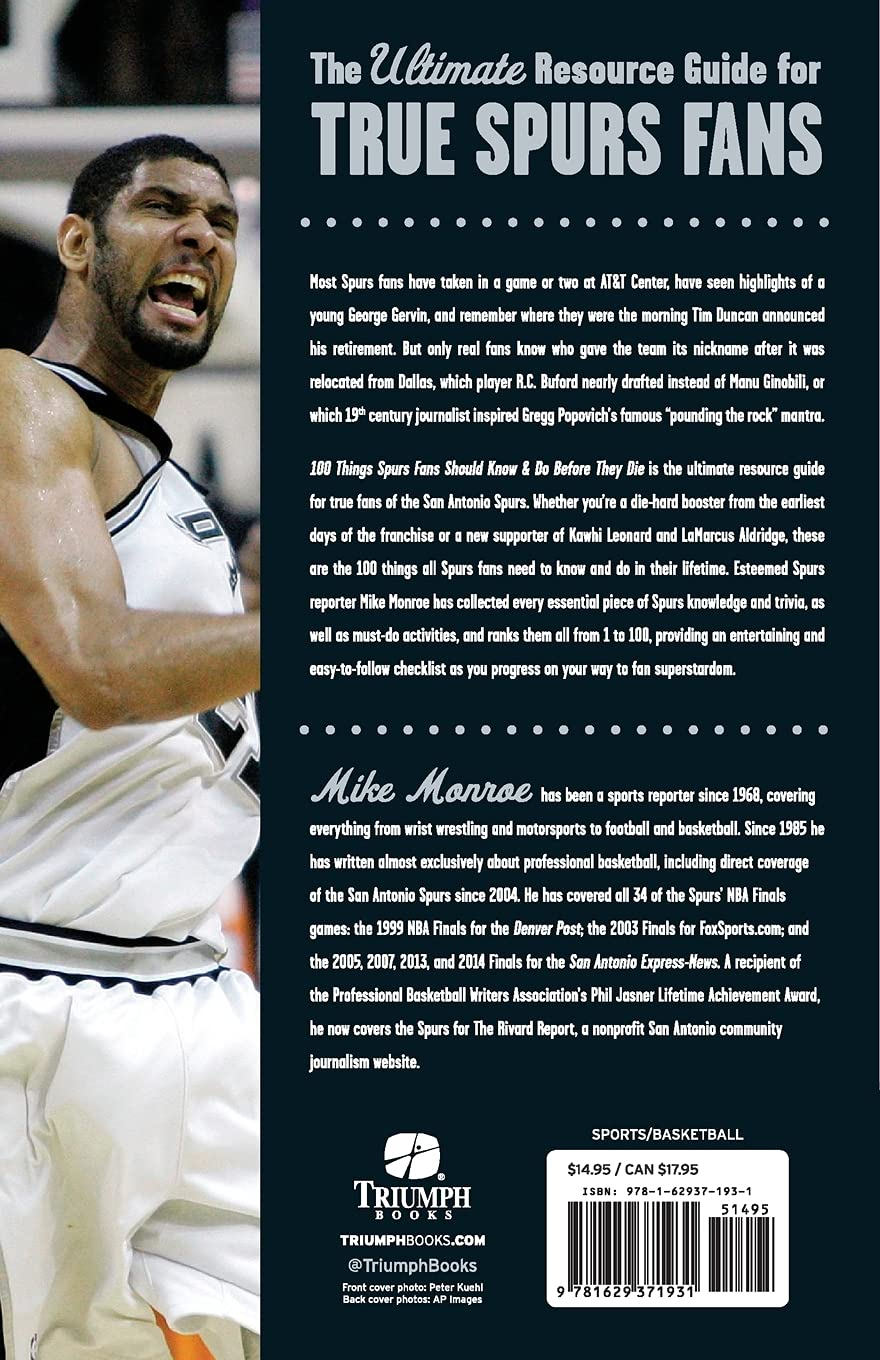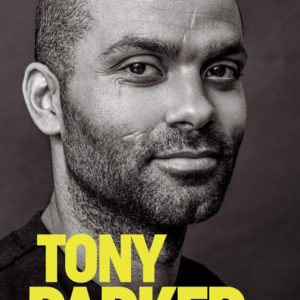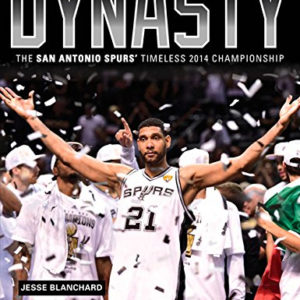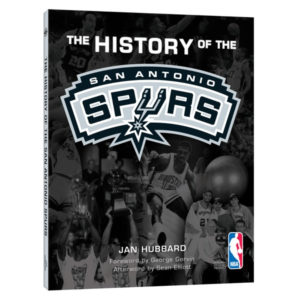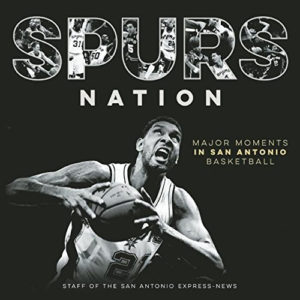100 Things Spurs Fans Should Know and Do Before They Die (100 Things…Fans Should Know)
Editorial Reviews
About the Author
Excerpt. © Reprinted by permission. All rights reserved.
100 Things Spurs Fans Should Know & Do Before They Die
By Mike Monroe
Triumph Books LLC
Copyright © 2016 Mike Monroe
All rights reserved.
ISBN: 978-1-62937-193-1
Contents
Introduction,
1. Tim Duncan,
2. Redemption: The 2014 NBA Championship,
3. The Admiral,
4. Gregg Popovich,
5. Breaking Through,
6. The Iceman,
7. Duncan’s Dominant 2003,
8. Manu Ginobili,
9. Tony Parker,
10. The Big Three,
11. The 2005 NBA Championship,
12. Memorial Day Miracle,
13. 28.2 Seconds,
14. Sweeping LeBron,
15. Pro Basketball Comes to San Antonio,
16. Iceman’s Scoring Title,
17. Duncan’s Dynasty,
18. MVP Admiral,
19. Sean Elliott,
20. Captain Late,
21. Salute the Little General,
22. R.C. Buford,
23. Larry Brown,
24. The Beautiful Game,
25. The 1987 NBA Draft Lottery,
26. 50 Wins,
27. Kawhi Leonard,
28. Bruce Bowen,
29. Big Shot Rob,
30. 1,000 Wins,
31. Red McCombs,
32. Gen. Robert McDermott,
33. Angelo Drossos,
34. All-Time Awards,
35. The 1997 NBA Draft Lottery,
36. Duncan’s Rookie Season,
37. The A-Train,
38. The End of an Era,
39. Global Outreach,
40. Manu Goes Batty,
41. The Los Angeles Lakers,
42. The Spurs’ Best Finals Game,
43. The Spurs’ Best Regular Season,
44. Peter Holt and San Antonio Spurs, LLC,
45. Reloading,
46. Danny Green,
47. LaMarcus Aldridge,
48. 2011: The Big Hiccup,
49. Desert Fever,
50. 71 Points,
51. The Merger,
52. The Rodeo Road Trip,
53. Doug Moe,
54. 0.4 Seconds,
55. Bones,
56. Dr. K,
57. The Popovich Legacy,
58. The Red Mamba,
59. Down Under,
60. Solar Eclipse,
61. Mitch,
62. Bob Bass,
63. Coach Bud,
64. Malik Rose,
65. Take a Stroll on the Riverwalk,
66. BoBo,
67. Becky Hammon,
68. Ettore Messina,
69. Three Arenas,
70. Michael Finley,
71. Give Thanks to Pomona-Pitzer,
72. Captain Jack,
73. Ginobili’s Foul,
74. The R.J. Deal,
75. The Chaparrals,
76. The Baseline Bums,
77. Salary Sacrifice,
78. The Larry Tour,
79. The Whopper,
80. Duncan’s Partners,
81. Spurs in the Olympics,
82. The Coyote,
83. Gregg Popovich’s Coaching Tree,
84. Dennis Rodman,
85. Alvin Robertson,
86. Visit the Basketball Hall of Fame,
87. Build a Spurs Library,
88. Terry Cummings,
89. U.S. Air Force,
90. The Bruise Brothers,
91. Go to a Spurs Road Game,
92. The Good, the Bad, and the Ugly,
93. Greet the Spurs,
94. The $250,000 Fine,
95. Find an Iceman Poster,
96. The 1979 Eastern Conference Finals,
97. Bob Hill,
98. The 1975 ABA All-Star Game,
99. Enjoy a Glass of A to Z Wine,
100. Take This Ultimate Spurs Fan Trivia Quiz,
Acknowledgments,
CHAPTER 1
Tim Duncan
When the Spurs won the 1997 NBA Draft lottery, the entire basketball loving world knew they would make Tim Duncan the No. 1 overall selection. The NCAA Division I Player of the Year had just set an all-time NCAA record for career rebounds (1,570) that would last until 2011. He was a can’t-miss prospect, a franchise changer, the best big man to come out of the college ranks since Shaquille O’Neal in 1992.
Even with such high expectations, nobody could have predicted the run of excellence that would make Duncan a member of the NBA’s mythical All-Time top 10, a list that includes legends like Michael Jordan, Magic Johnson, Larry Bird, Bill Russell, Oscar Robertson, Wilt Chamberlain, Kareem Abdul-Jabbar, and Elgin Baylor.
Spurs fans should make the case that he belongs in the All-Time top five.
What no one attending the draft at Charlotte Coliseum on June 25, 1997, knew about Duncan was the competitive fire that stoked his approach to the game nor the self-discipline that would allow him to drive himself through 19 seasons at a level of excellence never seen in a player of his age.
Consider: as a 21-year-old rookie in 1997–98 Duncan produced a Player Efficiency Rating of 22.6, a number that clearly identified him as an All-Star-caliber performer. Seventeen years later, as a 39-year-old veteran in 2014–15, he produced an identical PER, 22.6, and was named third-team All-NBA and made the All-Defensive second team.
The longevity of Duncan’s excellence is unparalleled in NBA history.
The native of St. Croix, U.S. Virgin Islands, benefited from playing alongside former NBA Most Valuable Player David Robinson from the very beginning of his career. Recognizing Duncan’s superior offensive skills, Robinson shared his go-to role on the Spurs with the rookie; the veteran led the team in points scored at 21.6, the rookie averaged 21.1. Duncan also averaged a team-high 11.9 rebounds per game and was named to the All-Defensive second team.
He was a unanimous choice as Rookie of the Year.
It took only one exhibition game against the Houston Rockets, in which Duncan scored 17 points and grabbed 17 rebounds while playing less than 30 minutes, for eventual Hall of Fame power forward Charles Barkley to declare: “I have seen the future and he wears No. 21. He was quite impressive, better than I expected, and I expected a lot. He’s polished. Very polished.”
Duncan was disappointed he was not able to push the Spurs past their playoff nemesis, the Utah Jazz, in that rookie season, the Spurs falling to Karl Malone, John Stockton, and Co., in five games.
He would not have to wait long to taste true playoff success.
An NBA championship, the Spurs’ first, in 1999, also produced the first of Duncan’s three Most Valuable Player performances in the Finals.
Taking over as the Spurs’ leading scorer in the lockout-shortened 1998–99 season, Duncan again made first-team All-NBA and first-team All-Defensive, but his dominant performance in the Spurs’ 4–1 NBA Finals triumph over the New York Knicks was even more impactful than what he had done in the regular season. He averaged 27.4 points, 14.0 rebounds, and 2.2 blocked shots per game and was a unanimous choice as the MVP of the series.
Duncan had to suffer through the disappointment of missing the playoffs with a knee injury in 1999–2000. It was bad timing for him and the club, as it preceded his first free-agent summer. He re-signed with the Spurs despite a serious push by the Orlando Magic to make Duncan and Pistons forward Grant Hill a free-agency package for the ages.
There would be more playoff disappointment — back-to-back losses to the Lakers in the 2001 and 2002 Western Conference semifinals, including being swept in 2001 with blowout losses (by 39 and 29 points) in Games 3 and 4.
Duncan won the first of his two regular-season Most Valuable Player Awards in 2001–02, when he averaged 25.5 points and 12.7 rebounds per game and was, once again, an All-Defensive first-team pick. None of that helped the Spurs in another disheartening loss to the Lakers in the conference semifinals.
When the Spurs met the Lakers in the 2003 semifinals, Duncan was a man on a mission. With a chance to close out the series in the Lakers’ Staples Center in Game 6, he poured in 37 points and grabbed 16 rebounds.
Duncan was a clear choice as league MVP that season, as well, with averages of 23.3 points and career highs of 12.9 rebounds and 2.9 blocks per game. When he led the Spurs to a 4–2 Finals win over the New Jersey Nets in the 2003 NBA Finals, he won his second Finals MVP Trophy, punctuating his domination with a near-quadruple double in the championship-clinching Game 6: 21 points, 20 rebounds, 10 assists, and eight blocks, one of the most dominant close-out games in Finals history.
The 2002–03 championship was a fitting punctuation to David Robinson’s Hall of Fame career; after he retired, even more of the Spurs’ scoring burden fell on Duncan’s shoulders. Though he would never again win another regular-season MVP Award, there was one more Finals MVP Trophy in his future. A thrilling, seven-game triumph over the gritty Detroit Pistons in the 2005 NBA Finals earned him the trophy in a close vote over teammate Manu Ginobili.
Duncan would earn a fourth championship ring on the 2007 Spurs team that swept young LeBron James and the Cleveland Cavaliers in the Finals, point guard Tony Parker taking Finals MVP honors.
Four titles, two MVPs, and three Finals MVP Awards in 10 seasons would have stamped Duncan as a megastar, but what followed in the next eight seasons would solidify his legacy as an all-time Top 10 player. Though he never again would average 20 or more points per game in the regular season, he continued to play at an All-Star level, even through the 2011–12 season, when he was omitted from the All-Star Game for the first time in his career. (There was no All-Star Game in the 50-game 1998–99 season.)
The Spurs would conclude that season on a 10-game win streak and then win their first 10 playoff games to take a 2–0 lead over the Oklahoma City Thunder in the Western Conference Finals. Four straight losses would spoil the great playoff run and lead to speculation that Duncan’s career might have come to an end. After all, he was 36 and at the end of a contract.
Instead, Duncan re-dedicated himself to an off-season conditioning program that includes various forms of martial arts training and re-signed with the Spurs for a 50 percent pay cut from the NBA-maximum $21.4 million contract on which he had played.
He made his fifth trip to the NBA Finals in 2013, only to suffer the heartbreak of a crushing defeat in Game 6 when the Spurs, leading the Miami Heat 3–2, blew a five-point lead with 28 seconds left.
When he missed a layup — and then a point-blank putback — that could have tied Game 7 with 41 seconds left, he said the game “will always haunt me.”
Duncan helped the Spurs exorcise the demons of that 2013 disappointment when he averaged 15.4 points and 10.0 rebounds in the Spurs’ resounding 4–1 2014 NBA Finals victory over the Heat.
Opting to return for a 19 season at age 39, Duncan finished the 2015–16 Spurs season with career totals that make him a sure-fire first-ballot Hall of Famer: 26,496 points (14 all time), 15,091 rebounds (sixth all time), and 3,020 blocks (fifth all time). He ranks first in Spurs history in games played, points scored, rebounds, and blocks.
After the Spurs were dismissed in the second round of the playoffs by the Oklahoma City Thunder, Duncan announced his retirement July 11, 2016, in typically low-key fashion: via a 543-word press release.
Hurricane Hugo
As a youngster, Tim Duncan put his competitive drive and athletic discipline into competitive swimming. Growing up on St. Croix, in the U.S. Virgin Islands, he had learned to swim at an early age, like nearly every youngster in the islands. He found that he loved competitive swimming and, by age 13, he had put up some of the best times in the United States in the 400-meter freestyle. He dreamed of representing the United States in the Olympics.
Then, on September 17, 1989, Hurricane Hugo, a Category 4 storm, slammed into St. Croix on a path that would make it one of the most deadly and destructive hurricanes ever. Duncan and his family survived its landfall but the pool at which he trained was ruined.
Forced to give up his Olympic swimming dream, Duncan channeled his athletic pursuits to basketball.
The rest is history.
CHAPTER 2
Redemption: The 2014 NBA Championship
After the 112–107 overtime victory over the Oklahoma City Thunder in Game 6 of the 2014 Western Conference Finals put the Spurs in an NBA Finals rematch with the same Miami Heat team that broke their hearts in the 2013 Finals, Spurs captain Tim Duncan expressed what every Spurs fan knew: the Spurs were thrilled to have a shot at redeeming themselves for having blown a title shot the previous June.
“We’re happy to be back here this year. We’re happy to have another opportunity at it,” Duncan said. “We’re happy that it’s the Heat again. We’ll be ready for them. We’ve got some experience, obviously, from last year against them, and we’ll go back and look at some film. And we’ve got that bad taste in our mouths still.
“Hopefully, we’ll be ready to take it this time.”
This was perceived by some in Miami, LeBron James in particular, as proof the Spurs didn’t like the Heat, an assertion coach Gregg Popovich called “silly.”
In truth, the Spurs had dedicated their entire season to redeeming themselves by proving they were still capable of winning another championship.
That they got the chance to do so against the Heat was just a bonus.
The process of redemption actually began when Gregg Popovich’s daughter, Jill, grew tired of his moping around in the weeks that followed the Game 6 collapse and Game 7 loss that cost the Spurs a chance to be a perfect 5–0 in trips to the NBA Finals.
Popovich admitted he just couldn’t stop thinking about Game 6 of the 2013 Finals, when the Spurs blew a 94–89 lead in the final 28.2 seconds of regulation time.
His daughter made him stop fretting and start planning a way for his players to get past the crushing disappointment.
Popovich recalled his daughter’s admonishment to San Antonio Express-News columnist Buck Harvey: “‘OK, Dad, let me get this straight: you won four championships, and you go to a fifth Finals. Other coaches lose all the time. But poor Greggy can’t lose because he’s special. Can you please get over yourself? End of story.'”
Popovich stared at her, then started laughing. Hadn’t his daughter told him the same “get-over-yourself” line he’s told so many others?
“That started me on the path to recovery,” he said.
Popovich’s response was to begin planning his annual retreat with his assistant coaches, this time in San Francisco, around a play-by-play analysis of Game 6. By pinpointing every single mistake that led up to the final 28.2 seconds he was able to show his players that it had not been the cruelty of “the basketball gods” that had “screwed” the Spurs. It had been all that had gone before those final 28.2 seconds that allowed the collapse to occur.
“We hit them right between the eyes with what we could have done better,” Popovich said. “That’s a whole lot better than ‘The basketball gods did it to us.’
“That doesn’t help anybody.”
The entire 2013–14 season was dedicated to getting back to the Finals, and when the trip finally was ticketed with the 4–2 elimination of a very good Thunder opponent, Duncan simply stated the truth: the Spurs were happy they were playing the Heat.
The regular season had produced an NBA-best record of 62–20, assuring the Spurs home-court advantage in every round of the playoffs, including the Finals. Their playoff run had begun with a reality check: a first-round series against the Dallas Mavericks that extended to seven games, a reminder that their standout season guaranteed nothing.
They regained their footing with a 4–1 second-round domination of a very good Portland Trail Blazers team and then prevailed in the Western Conference Finals against the Thunder and Kevin Durant, the regular-season scoring champion and Most Valuable Player.
By the time the Finals arrived, their “beautiful game” offense, with an emphasis on ball movement, player movement, and going from a good shot to a great shot, was working to perfection.
Game 1 produced a 110–93 win that was tougher to secure than the final score made it appear. The team’s Big Three — Tim Duncan, Manu Ginobili, and Tony Parker — combined for 56 points but the outcome was not secured until the final two minutes, when the Spurs scored 11 unanswered points.
Game 2 was a reminder of how things could unravel if the Spurs did not adhere to their season-long philosophy. Making only 43.9 percent of their shots as the ball too often got “stuck” in a non-existent offensive flow, the Spurs dropped a 98–96 decision that cost them home-court advantage and had Spurs fans fearing another heartache against the Heat.
Afterward, Popovich summed up the game and his team’s season-long offensive approach: “You move it or you die.”
Popovich then made a strategic move that changed the series. Replacing Tiago Splitter with Boris Diaw, one of the game’s best interior passers, in the starting lineup re-ignited the share-the-ball offense and produced 59.4 percent shooting. The move translated into a 111–92 win that was even more dominant than the score made it seem.
When the Spurs followed with a 107–86 victory in Game 4, the series returned to San Antonio for a chance to secure the championship in front of their fans.
In Game 5, Kawhi Leonard broke out for 22 points and 10 rebounds while also defending Miami star LeBron James with minimal double-team help. The result: another blowout victory, 104–87.
The Spurs’ overall margin of victory, 14.0 points per game, made the series the most dominant Finals in NBA history. They shot a Finals record 52.8 percent and made a record 55 three-pointers despite playing only five games.
Most remarkably, they did it without the kind of singular scoring star that has typified the majority of champions throughout league history; five players averaged between 10.2 and 18 points per game in the series. They completed their run with the lowest leading postseason scorer (Tony Parker at 17.4 points per game) of any NBA title winner since the 1951 Rochester Royals.
Leonard was named Finals MVP but both Duncan and Diaw received votes from the nine-person media panel, clear indication the triumph had been a team accomplishment.
“We’re a true team, and everybody contributes,” Parker said. “Everybody did their job. We did it together, and that was the whole key.”
Even the Miami players understood that what the Spurs had accomplished was transformative.
“That’s how team basketball should be played,” said James, the four-time league MVP. “Guys move, cut, pass. You’ve got a shot, you take it, but it’s all for the team and it’s never about the individual.”
In his post-championship address to his team, Popovich revealed precisely what the series had meant to him and, by extension, to all of Spurs Nation: “I’ve never been prouder of a team, nor have I ever gotten as much satisfaction from a season in all the years I’ve been coaching. To see the fortitude you guys displayed, coming back from that horrific loss last year and getting yourselves back in position and doing what you did in the Finals. You are really to be honored for that and I just can’t tell you what it means.”
That’s enough to make it the most meaningful of the five championships the Spurs have won since entering the NBA in 1967.
Playing with Pain
Nearly as amazing as the Spurs’ domination of the Heat in the 2014 NBA Finals was the fact that two of the stars of the series completed the team’s triumphant playoff run with significant injuries.
Manu Ginobili, whose powerful dunk over Miami’s shot-blocking star, Chris Anderson, late in Game 5 was one of the highlights of the series, was discovered to have a stress fracture in his right leg. Turns out Ginobili had played with the ailment throughout most of the playoff run, a remarkable turn of events considering how well he played during the postseason.
The play of backup point guard Patty Mills, who averaged 10.0 points per game and made 13-of-23 three-pointers during the Finals, was even more remarkable considering the fact he was found to have a torn rotator cuff in his right shoulder that required surgery a few days after the conclusion of the series. Recovery from the operation forced him to miss the first 31 games of the 2014–15 season, but his willingness to play with the discomfort through the bulk of the season and into the playoffs was vital to the team’s fifth championship run.
(Continues…)Excerpted from 100 Things Spurs Fans Should Know & Do Before They Die by Mike Monroe. Copyright © 2016 Mike Monroe. Excerpted by permission of Triumph Books LLC.
All rights reserved. No part of this excerpt may be reproduced or reprinted without permission in writing from the publisher.
Excerpts are provided by Dial-A-Book Inc. solely for the personal use of visitors to this web site.
From the Publisher


